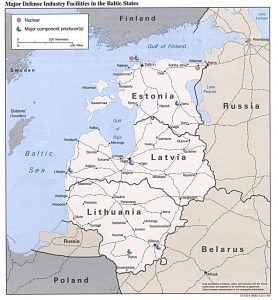Defending a Free Society
Note: Liberal in this article refers to broadly classically liberal values.
I am not already against the next war. There is a good chance I will be, but there are circumstances where I think going to war is a necessary. This does not mean that I am pro-war. If a war is going on, it means that something horrifically amoral has happened, and at least one side is wrong – and often both sides are. But there are situations when one side is in the wrong, and war is the result of preventing this aggressive wrong-doing. In these cases, nations are justified in defending themselves, and defending others — provided certain preconditions.
Realpolitik is a strategy, usually associated with Otto von Bismarck of Germany, but also associated with other figures, such as George H.W. Bush. It is a pragmatic idea of foreign policy that says neither war or peace are always the answer, and that experts must judge the means to meet their ends. In Bismarck’s case, he invaded Austria and France with the goal of creating a German Empire, then once this happened, tried feverishly to prevent Germany from going to war with Russia and France.
At this point, this sounds imperialist, but the important thing to remember is that Realpolitik is a description of the means not the ends. Bismarck’s end goal was to unify Germany into an Empire and make it a great power. Those are ends which I cannot endorse, however, there is no reason that Realpolitik can’t be our strategy for defending general peace and liberty. This is what I will attempt to demonstrate: that a consistently pragmatic, but calm and predictable, system of national defense with constitutional safeguards is better means of keeping peace and liberty than isolationism.
A realistic and liberal approach to foreign policy would seek to optimize the defense of our liberty by combating forces which explicitly want to take it away, and by allying ourselves with other liberal nations which have the same goals for themselves. Creating a robust defensive network that improves our own defense and allows smaller nations to choose to be free.
To start with, we ought to establish what the ends of a liberal society are with regards to foreign policy. This is the biggest point which differentiates a classical liberal’s Realpolitik, and neoconservatism or other forms of Realpolitik. The ends of our foreign policy is not to promote American interests, or even to keep us safe – it is to keep us free. As such, the foreign policy we use cannot restrict our liberty, or it would be a violation of its own ends. Thus, constitutional restraints are a pivotal part of a realistic foreign policy.
If you are going to have a realistic defense of liberty, you must recognize that foreign policy experts and the military are not exempt from the implications of Public Choice. They don’t automatically make righteous decisions because they are in a uniform, and they are subject to understating the importance of civil justice. Just like we try to have constitutional safeguards on domestic politicians, we must have them on those tasked with foreign policy. Two of the most important are:
- There shouldn’t be a draft. Enslaving people to defend liberty is an insufferable paradox. If a war cannot get enough voluntary support to fight it, there is something wrong with that war.
- Due Process of Law everywhere possible: even terrorists. The Declaration of Independence explicitly says all men are endowed with inalienable rights, not just American citizens.
Just like there are constitutional safeguards to make a realistic liberal policy liberal, there are general rules of foreign policy that make it realistic. These too distinguish a realistic foreign policy from neoconservatism.
- It is impossible to defend liberty in a society that is hostile to liberty. The people there have the right to be free, and it is not a right of the local society to ‘decide’ to repress liberty. However, it is just not possible for us to enforce a liberal legal code when the local people don’t believe it. As we have learned from interventions in Vietnam and Iraq.
- It is not possible to invade a country and make them believe in liberty.
Failure to recognize these general rules is what made neoconservative foreign policy a disaster; not just because it trampled on civil liberties, but also because it failed to do what it sought out to do. It was neither liberal, or realistic.
Where a realistic approach is distinct from total isolationism is when it comes to defending countries that have chosen to be free by themselves, and combating forces which explicitly want to restrict our liberty.
We must recognize that there are states in the world, and that some are aggressive and imperialist. I am often perplexed by people who accuse the US government of imperialism, but dismiss that the Russian Government would invade parts of eastern Europe given the opportunity. We must be skeptical of all governments, not just our own.
Furthermore, aggressive and imperialist states are willing to use brutal collective forces to achieve their ends, as history will attest to. States with large powerful nations at their disposal have the capacity to conquer and tyrannize nations which do not have that strength. History shows this to be true as well.
The only chance for small nations with liberal societies to defend themselves from illiberal societies with massive states is to have defensive agreements with other liberal nations. A nation in this situation is Estonia.
 Estonia is a nation which borders the Baltic sea to the west and Russia to the east. It used to be a part of the Soviet Union, but gained its independence when the Soviet Union collapsed. Since then, it has moved to become a liberal western democracy, adopting free market policies which led to rapid economic growth after gaining independence. It even had the first and only libertarian Head of State since the end of the Cold War. However, Estonia is a nation of 1.3 million people bordering Russia, whose military consists of 771,000 active duty personnel and over 2 million in reserves. Russia has occupied Estonia before, and would be willing to do so again if it could. There is nothing Estonia, having to fend for itself, would be able to do to prevent a Russian occupation. If you believe that the United States and other nations should not come to the defense of other nations, then you must answer the question: what should Estonia do? And this is the thread that leads to isolationism collapse.
Estonia is a nation which borders the Baltic sea to the west and Russia to the east. It used to be a part of the Soviet Union, but gained its independence when the Soviet Union collapsed. Since then, it has moved to become a liberal western democracy, adopting free market policies which led to rapid economic growth after gaining independence. It even had the first and only libertarian Head of State since the end of the Cold War. However, Estonia is a nation of 1.3 million people bordering Russia, whose military consists of 771,000 active duty personnel and over 2 million in reserves. Russia has occupied Estonia before, and would be willing to do so again if it could. There is nothing Estonia, having to fend for itself, would be able to do to prevent a Russian occupation. If you believe that the United States and other nations should not come to the defense of other nations, then you must answer the question: what should Estonia do? And this is the thread that leads to isolationism collapse.
If we decide that Estonia is not worth defending, then why should we not defend the rest of the Baltic nations? They are also far away and small, why should we worry about their liberty? And what makes Alaska different? Or your neighbor’s home? Or your home? The process of elimination continues to its natural conclusion, that nobody’s liberty is really worth defending.
At some basic level, we all depend on collective defense of our liberty, because those who would restrict liberty will not hesitate use collective force. Neglecting to defend people’s freedom because it is too hard is a path which will lead directly to our own liberties being too hard to defend.
The consequences of this can be seen in history. When Britain and France refused to defend Czechoslovakia in 1938 they did so to secure “Peace in our Time.” Instead, they allowed Nazi Germany to consume Europe in piecemeal. France was conquered, and Britain was engaged in a brutal war for six years. Had Britain and France defended Czechoslovakia in 1938, fewer nations would have been occupied by the Nazis, World War II would have been shorter, and fewer people would have died.
If your foreign policy results in a war which is longer and more brutal than it would have otherwise been, your policy is not antiwar. If your foreign policy results in an authoritarian state growing in piecemeal across the world, your policy is not libertarian.
This piece solely expresses the opinion of the author and not necessarily the organization as a whole. Students For Liberty is committed to facilitating a broad dialogue for liberty, representing a variety of opinions. If you’re a student interested in presenting your perspective on this blog, visit our guest submissions page.
